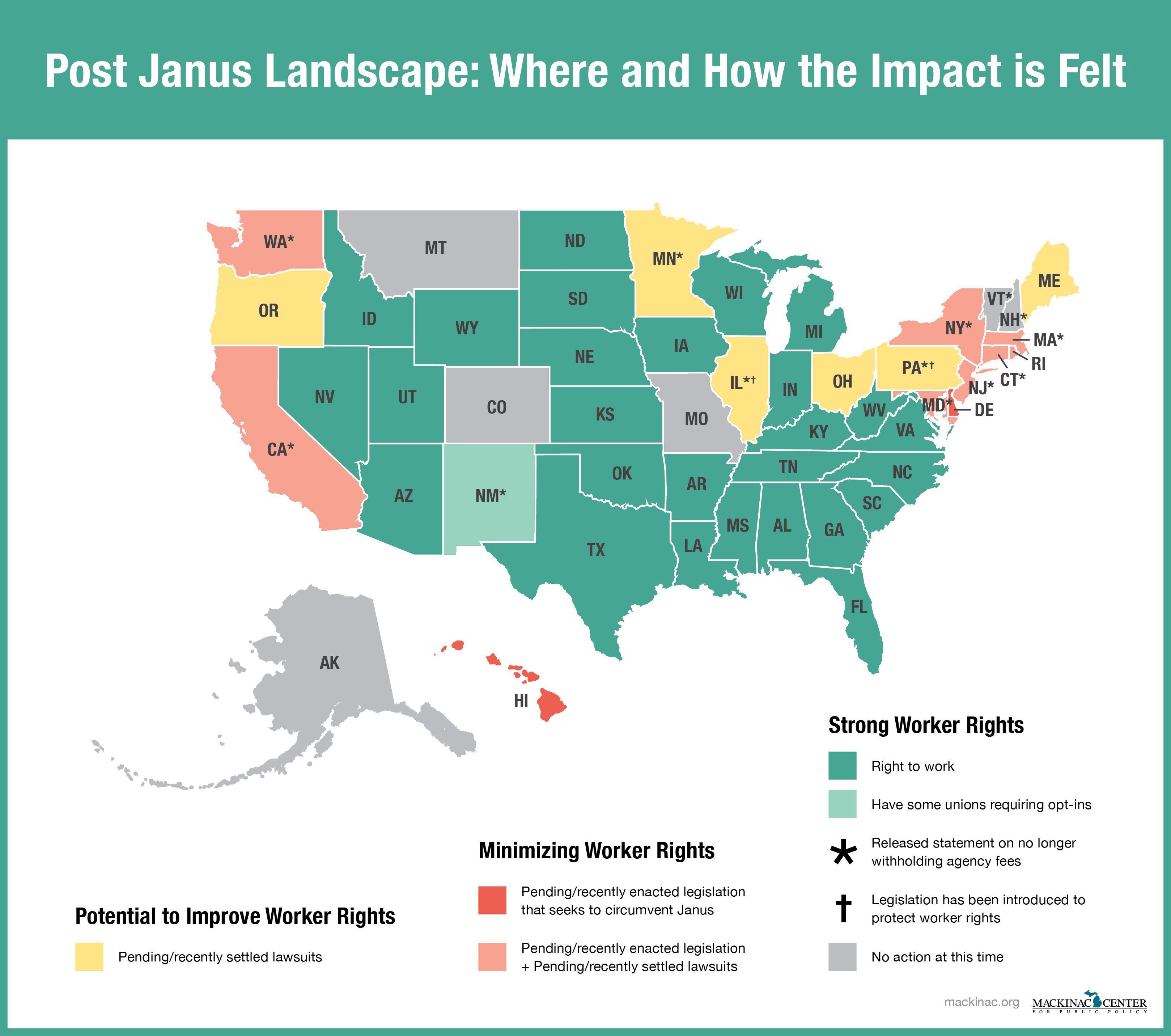

Janus v. AFSCME is a case in front of the U.S. Supreme Court filed by the Illinois-based Liberty Justice Center and the Washington, D.C.-based National Right to Work Legal Defense Foundation on behalf of Mark Janus, an Illinois state employee. If the justices rule in favor of Janus, the decision could:
Provide right-to-work protection for all public employees in the country. Right-to-work means a union cannot get a worker fired for not paying dues or fees.
Allow public workers to opt out of their union without needing to renew their objection every year. Currently, many unions require members who opt out to redo the paperwork each year in order to refrain from paying for union politics.
All workers, whether they are in a right-to-work state or not, have the right to leave their union.
In non-right-to-work states, however, employees can only opt out of paying the portion of their dues that go directly to support political causes or candidates. They still must pay the vast majority of their dues in what are known as agency fees.
Mark Janus argues collective bargaining in the public sector is inherently political, and government unions devote more resources to their political agenda than just the small portion of dues which are exempt from agency fees. Because of the political nature of collective bargaining, workers have a First Amendment right to not pay any dues or fees to a union.
If the justices rule in favor of Mark Janus, government workers across the country would not need to pay unions as a condition of employment. Workers in the 28 right-to-work states already have this right and some government workers in a few non-right-to-work states have similar rights. This means that such a decision would only affect workers in roughly half the states in the country.
Further, Mackinac Center research provided to the Supreme Court in two amicus briefs (available here and here) on the similar and related Friedrichs case has shown that in right-to-work states, only about 20 percent of unionized workers exercise these rights, meaning that unions in these states still have the financial support of about 80 percent of workers on average.
On March 29, the U.S. Supreme Court issued a one-line ruling on a case that would have brought right-to-work protections to public employees across the country. ... more
The United States Supreme Court has taken up a case that most legal pundits predict will deal a severe blow to government employee unions. ... more
Mark Janus learned about public service from a young age, growing up as a Boy Scout in Springfield, Illinois. ... more
Should government employees have to pay money to a union just to keep their jobs? ... more
With their billion dollar forced dues machine, Big Labor has managed to hold an iron-fist over public sector employees and forced them to pay tribute to a union boss just to get or keep a job. ... more
A group of California teachers fighting mandatory union fees at the U.S. Supreme Court had, by all appearances, a good day Monday. ... more
The U.S. Supreme Court hears oral arguments today on a case that could end mandatory union dues and fees for public sector workers, which are currently required in about half the states in the country. ... more
Union officials haven’t found a very receptive audience for their warnings of a doomsday scenario in a legal case about making teachers pay dues in order to keep their jobs. ... more
In what could serve as a vindication for Gov. Bruce Rauner, the U.S. Supreme Court on June 30 announced it will take a case that could potentially grant Right to Work ... more
The end of June is always an interesting time at the United States Supreme Court. It is usually when the court announces decisions in its most important and controversial cases. This year was no exception, as the ... more
In California, workers represented by a union can choose not to be a full member of that union, but they are still forced to pay a fee to the union or risk being fired. That could change next year, if a group of ... more
The Mackinac Center for Public Policy’s Director of Labor Policy F. Vincent Vernuccio was quoted recently in The Detroit News’ latest coverage of the U.S. Supreme Court case Friedrichs v. California Teachers ... more